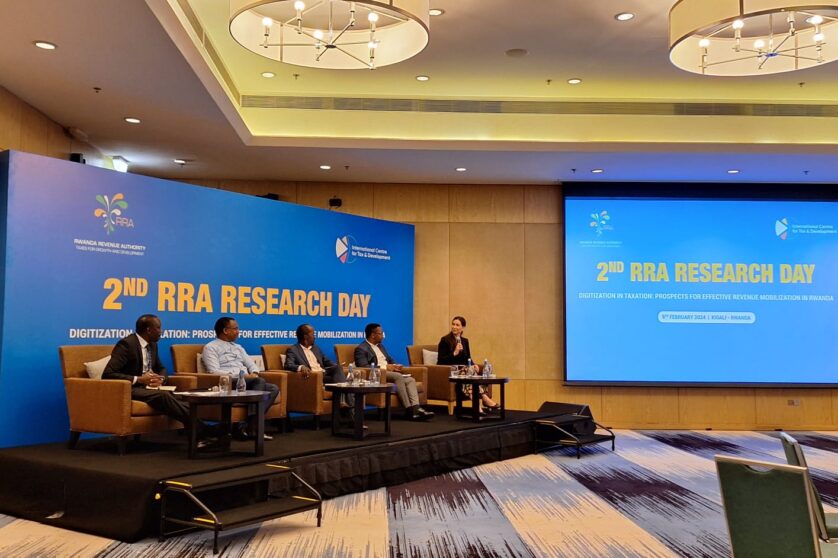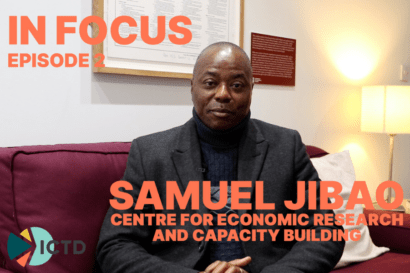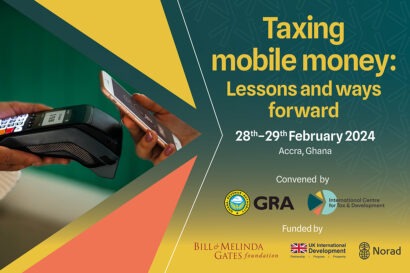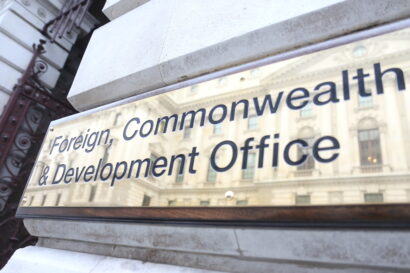On February 9, 2024, the Rwanda Revenue Authority (RRA) and the International Centre for Tax and Development (ICTD) co-hosted the 2nd RRA Research Day which focused on the pivotal role of technology in improving tax administration. Rwanda has been leading the way on the digitalisation agenda featuring a solid e-government platform, wide adoption of digital payments in the economy and a robust connectivity infrastructure. The RRA has been a central part of these efforts and is at the forefront of digitalisation in tax administration: it was amongst the first revenue authorities on the African continent to fully digitalise the submission of tax declarations, to adopt electronic billing machines, and to make full use of digitised data both to enhance administration and to generate policy analysis. The ICTD has been a key partner in this process, signing an MoU with RRA and having ICTD research director Giulia Mascagni also acting as Research Advisor to the tax administration. In this context, ICTD evaluated many initiatives around technology implementation and provided evidence to inform decision-making. In particular, ICTD’s DIGITAX programme has produced a large body of evidence from Rwanda and beyond. ICTD has been partnering with RRA in organising research day events, as a way to convene research discussions and disseminate research ran or co-led by RRA, the first of which took place in 2023. The 2nd RRA Research Day brought together esteemed personalities from relevant institutions to discuss Rwanda’s leading innovations in digitalisation and the implications for tax policies and systems across Africa. Here is our summary of key insights shared by speakers throughout the event.
Cultivating a Culture of Research Excellence
RRA’s Commissioner General, Pascal Bizimana Ruganintwali, started the conference by affirming the importance of research excellence to improve tax administration and increase tax revenue in an efficient and equitable way. Emphasising the organisation’s commitment to achieving middle-income country (MIC) status by 2035, the CG underscored the critical role of taxation – and tax research – in this journey. The RRA has been leading the way in establishing partnerships with international research organisations to tap the potential of its own administrative data. The ICTD is a long-time partner, celebrating this year a decade of research collaboration. Other partners include the Tax Administration Research Centre, the International Growth Centre and the World Bank – all of which were represented and participated in the Research Day. Ruganintwali highlighted practical examples in which research conducted by the RRA yielded tangible impacts, including the recent deregistration of over 40,000 inactive taxpayers aimed to reduce their compliance costs, avoid unnecessary sanctions, and improve the quality of the tax registry. The CG highlighted how this measure directly stems from joint RRA-ICTD research on inactive taxpayers.
Government’s vision on digitalisation
In their panel contribution, the Permanent Secretary of the Ministry of Information and Communication Technology (ICT), Mr Yves IRADUKUNDA, highlighted the forward-looking leadership that has propelled Rwanda’s technological advancements. Acknowledging the pivotal role of information technology in driving economic growth, the Ministry underscored investments in capabilities, systems, and connectivity infrastructure. By harnessing the power of data, tax authorities can gain valuable insights into business trends, inform interventions, and capture informal economic activities. Moreover, the power of collaboration, particularly with the private sector, was emphasised as instrumental in building robust ICT ecosystems and executing visionary initiatives. Lastly, Mr Iradukinda emphasised the goal of technology in enabling access to government services in an inclusive fashion.
Insights from Irembo: A Public-Private Partnership
Irembo is a public-private partnership focusing on citizen service delivery across several government functions, such as identification and birth documentation, immigration, police and land ownership. Its founding CEO, Mr Clement UWAJENEZA shared insights into their endeavours. They highlighted the organisation’s willingness to accelerate activity, emphasising that the ultimate goal was to provide citizens with seamless access to services, fostering inclusivity. Irembo also demonstrated the gains from involving private entities to contribute to digitalisation efforts in tax administration and beyond. Importantly, RRA’s IT innovations open doors for digitalisation in other areas of government. RRA is considered as a catalyst for IT reforms in the government as a whole, as it spurs a friendly environment to technology for other public institutions.
RRA embracing digitalisation
The Deputy Commissioner General, Mr Jean-Louis Kaliningondo, provided a comprehensive overview of Rwanda’s digitalisation initiatives and their impact on tax administration. For example, the DCG emphasised the multifaceted benefits of Electronic Billing Machines (EBMs), extending their usage to small non-VAT taxpayers and integrating them into various tax processes. This is an example of how Rwanda remains at the forefront of digitalisation, with other countries taking inspiration and guidance in their ICT-driven journey. Also, thanks to the convening role of the African Tax Administration Forum (ATAF), Rwanda has been able to export lessons on EBMs to other African nations. Digitalisation in RRA is also helping boost core functions, such as registration and identification of taxpayers, facilitation of filing and payment of taxes, and enforcement through data-driven audits.
However, the DCG also acknowledged challenges such as initial costs of major digital innovations, digital literacy, and cybersecurity threats, stressing the need for prioritisation and a blueprint for digital transformation. He also presented opportunities for future improvement in this area, including the expansion of digitalisation for the 643 internal and external RRA processes, of which only a third are digitalised at the moment.
Lessons from ICTD research: Opportunities and Risks of Digitalisation
ICTD’s Research Director Giulia Mascagni provided an external perspective based on ICTD’s extensive research on these topics in lower-income countries. She highlighted both opportunities and risks associated with digitisation in tax administration. Key opportunities include leveraging digitised data to improve enforcement and increase revenue, while also opportunities for policy analysis to improve progressivity, equity, and efficiency of tax systems. She also stressed the risks associated with technology adoption, including complexity and costs that taxpayers face in navigating tax systems, as well as the need to ensure inclusion of all groups especially those who might be less prepared for digital solutions. A key take-away from research is about leaving no one behind in the digital transformation journey – a challenge faced by countries at any level of income, which featured prominently in the discussions.
Importantly, she emphasised that the full potential of digitalisation can only be unlocked if parallel improvements also occur in analytical capacity to use the huge amount of data produced in digitised processes, as well as traditional face-to-face government functions such as audits. Traditional in-person support is also needed when automatic checks go wrong, for instance when refusing legitimate refund claims.
Toward a Digitally Enabled Future
Through collaborative efforts, innovative partnerships, and research-driven approaches, Rwanda has emerged as a trailblazer in digitalisation, setting a precedent for other African nations to follow. The conference clearly emphasised the learning potential for other countries in the continent, as exemplified by the RRA-ATAF collaboration on EBMs. As Africa navigates the complexities of digital transformation, it is imperative to prioritise capacity building, cybersecurity measures, and inclusive strategies that ensure equitable access to digital services. By harnessing technology intelligently and fostering a culture of innovation and collaboration, African countries can unlock new opportunities for economic growth, social development, and sustainable progress in the digital age.



